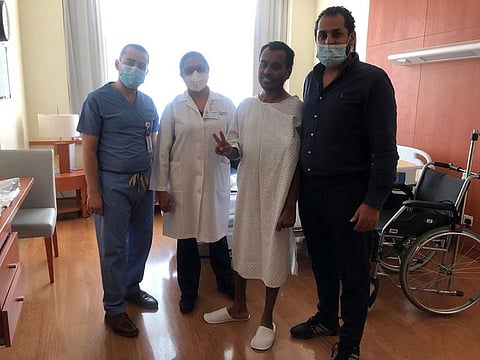I was given a second chance at life, says man in Dubai after waking up from 30-day coma
Successful surgical intervention by doctors helps revive Indian after brain haemorrhage

Dubai: An Indian expatriate who lapsed into a coma after a severe headache was revived by doctors at a Dubai-based hospital after nearly 30 days.
On what seemed like a regular workday, Mujeeb, a 41-year-old Indian driver, went to his work place at a hotel at the Palm. He had no idea about the terrible health crisis that was just around the corner as he suffered a ruptured brain aneurysm that was addressed by a team of surgeons at Al Zahra Hospital, Dubai.
Recounting his tale, Mujeeb said: “It was just a regular day at work when suddenly I felt a terrible headache that I had never experienced before. I was later told that it had developed into a seizure and my colleagues called in the ambulance and rushed me to the hospital.”
Burst brain aneurysm caused brain haemorrhage
Describing the medical aspect of the case, Dr Mohammed Khamis, Critical Care specialist and primary care physician in charge of the patient, said: “The patient was otherwise fit and healthy with no previous symptoms whatsoever. When he was brought to the hospital’s Emergency Room (ER), the doctors managed to conduct a CT scan of his brain and the brain arteries revealed a severe haemorrhagic stroke caused by brain aneurysm.”
Mujeeb was put on a ventilator and admitted to the intensive care unit (ICU). “He was operated upon for an emergency insertion of a drain in his brain to flush out excess fluid and blood and to closely monitor the pressure in his brain. On the same day, he underwent another procedure to repair his brain aneurysm that had caused the bleeding,” explained Dr Hussein Al Rahma, head of Critical Care and Emergency Medicine at the hospital.
Second surgery
Unfortunately, despite the two procedures, the patient’s brain pressure continued to remain high and so four days after his admission, he had to undergo a second surgery to place a second drain on the other side of the brain to remove still more fluid that had continued to accumulate in the brain, even as the patient continued to remain in coma.
Mujeeb did not regain his consciousness and was in coma for 30 days in the ICU and developed complications of severe brain infection. “Even though he was given aggressive IV antibiotic therapy, his case needed local injection of antibiotics inside the brain to fight the brain infection he had developed. Because of the long-term ventilation, he needed a tracheostomy — an incision in the neck in order to insert a breathing tube into a person’s windpipe — to avoid complications from a prolonged ventilation,” Dr Khamis added.
Miraculous revival after 55 days in ICU
After 55 days of intensive care, his condition stabilised and the swelling in his brain began to subside. As doctors detected some normal brain activity, they tried to revive Mujeeb. As he started to slowly regain his consciousness, doctors worked to wean him off the mechanical ventilator and eventually when he was able to breathe independently, he was taken off the device completely and moved to a regular room where his rehabilitation process continued, under the supervision of a neurologist, after he had spent 55 days in ICU. He remained in coma for a total of 30 days before finally waking up.
Grateful to have his life back, Mujeeb, who regained full control of his faculties and brain functions, said: “I am very grateful to all the doctors who supervised my care during this period. I know I was given a second chance at life and for that I feel very lucky. This is a miracle for me and I am gradually getting back my strength.”
Sign up for the Daily Briefing
Get the latest news and updates straight to your inbox






